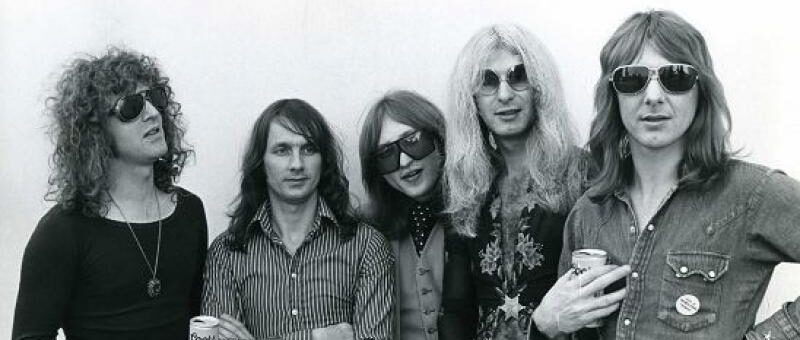By IAN McFARLANE
MOTT the Hoople were the great unsung heroes of the early seventies UK hard rock scene. At a time when technical sophistication was the order of the day, the band upheld the raw spirit of rock’n’roll with their glamorous, yet roughneck image (as epitomised by the shades and sneer of singer Ian Hunter), gruff urban cool and aggressive stage presence. Mott the Hoople was pure’70s glam metal sleaze.
The band’s roots go back to Herefordshire, England, where guitarist Mick Ralphs, drummer Dale ‘Buffin’ Griffin, bassist Pete ‘Overend’ Watts and organist Verden Allen had played under various names during the late sixties. They added singer Ian Hunter at the suggestion of producer Guy Stevens, taking Mott the Hoople from the title of an obscure novel by Willard Manus.
Between 1969 and 1972 the Hoople built up a dedicated following, based on a fierce live reputation and the release of four albums on Island Records, Mott the Hoople (1969), Mad Shadows (1970), Wild Life (1971) and Brain Capers (1971). Produced by Guy Stevens and although chock full of crashing guitars and driving rock, none of the records was commercially successful.
With morale at an all-time low, the band was ready to pack it in until David Bowie intervened. Indeed they had officially split up, Hunter later documenting the trauma in ‘Ballad of Mott the Hoople (March 26, 1972 – Zurich)’, one of the best laments for rock ever written. Bowie, who was then on the rise to superstar status with his Ziggy Stardust persona, declared himself to be an arch Hoople fan and urged them to stay together. He wrote and produced their first hit single, the classic glitter kids anthem “All the Young Dudes”, which reached #3 in the UK. He also produced the album of the same name, which gave the band a stronger belief in their abilities.
Their new-found confidence was evident on the excellent 1973 album Mott, the peak of the band’s career in the UK. The set yielded the hits “Honaloochie Boogie” and “All the Way from Memphis’, both written by Ian Hunter. The subsequent single, ‘Roll Away the Stone’, completed a trio of Hunter-composed UK Top 20 hits, but his increasing domination of the band also brought problems in equal measure. Verden Allen was the first to leave, followed by Mick Ralphs in 1973.
It was said that Ralphs had written “Can’t Get Enough” for Mott the Hoople, but that Hunter didn’t possess the range to sing it adequately. Ralphs fell in with ex-Free singer Paul Rodgers, who could sing the songs he was writing much better, with the pair joining forces in the successful Bad Company. Meanwhile, for the Hoople’s first headlining tour of the United States in August 1973, Ralphs was replaced by ex-Spooky Tooth guitarist Luther Grosvenor who adopted the stage name of Ariel Bender. Keyboardist Morgan Fisher also joined the band at this time.
Thus re-constituted, they cut the satisfying album The Hoople in early 1974, followed by the exciting in-concert set Mott the Hoople Live. Both albums reached the US Top 30 and suddenly the band was very fashionable in the States, as demonstrated by their week of sold-out shows at the Uris Theatre on Broadway, New York.
Yet, despite the success and adulation, Hunter began making noises about splitting once again. Grosvenor didn’t wait to find out his plans and quit in August 1974. Bowie’s former sideman, guitarist Mick Ronson, was brought in as replacement. He cut one single with the band, “Saturday Gigs”, which sounded like a farewell.
Things moved fast after that. Only three months after Ronson’s arrival, Hunter was admitted to hospital suffering a nervous breakdown. The rest of the band was stunned to hear that their upcoming British tour had been cancelled as a result. Amidst a flurry of rumours, accusations and counter-accusations, it eventually became apparent that Hunter planned to team up with Ronson in a new band. They both recorded solo albums which they toured together to promote, while Griffin, Watts and Fisher recruited singer Nigel Benjamin and guitarist Ray Majors into the surviving band, simply renamed Mott.
Mott released two albums, Drive On (1975) and Shouting and Pointing (1976), before replacing Benjamin with ex-Medicine Head singer John Fiddler and changing their name in 1977 to British Lions. Ironically they were swiftly buried by the late ’70s avalanche of new wave bands, many of whom cited Mott the Hoople as one of their formative influences. Throughout a career of dizzying highs and pitiful lows, Mott the Hoople remained a great band in the long and honourable tradition of British rock’n’roll extravagance.
From HOT METAL, January 24, 1991 | Copyright Ian McFarlane 1990 | Reproduced with permission
-
LA Guns – Waking The Dead
-
Bon Jovi – Keep The Faith
$53.74 -
Motley Crue – Cancelled EP (CD)
$30.08 -
Slash – Orgy Of The Damned CD and vinyl
$23.33 -
Skid Row – Subhuman Race vinyl
$57.03 -
Riley’s LA Guns – Renegades
$65.99 -
Motley Crue – Shout At The Devil 40th anniversary boxed set
$271.88 -
KISS – Creatures Of The Night 5CD blue ray boxed set
$317.42






























